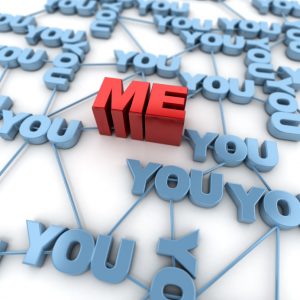Is Social Media to Blame for the Rise in Narcissism?

Studies are now showing what many of you may have suspected: We are living in an increasingly narcissistic society.
In a world where prime-time television is dominated by a “reality” as false as the Kardashians’ lashes, and people sit across dinner tables checking in on Facebook rather than having face-to-face conversations, this may not come as a surprise.
Much has been written about the rise of narcissism amongst millennials, the generation born in the 1980s and 1990s, a generation controversially dubbed “Generation Me” by Professor Jean M. Twenge in 2007. In her most recent work, The Narcissistic Epidemic: Living in the Age of Entitlement, Twenge (with W. Keith Campbell) explains: “In data from 37,000 college students, narcissistic personality traits rose just as fast as obesity from the 1980s to the present.” The comparison to obesity suggests that narcissism is another epidemic in America.
Perhaps more troubling, a handful of new studies comparing traits and life goals of young people in high school and college today with those of Gen-Xers and baby boomers at the same age, show an increase in extrinsic values rather than intrinsic values. Millennials are more likely to value money, image and fame over community, affiliation and self-acceptance.
So who’s to blame for this generational increase in narcissism?
Can we pin the tail on Mark Zuckerberg and the advent of Facebook? Over the last couple years, a plethora of research has been pouring in that makes connections between Facebook and narcissism. Studies are consistently finding that people who score higher on the Narcissistic Personality Inventory questionnaire tend to have more friends on Facebook, tag themselves more often in photos and update their statuses more frequently. According to Laura Buffadi, a postdoctoral researcher at the Universidad de Dueto in Bilbao, Spain, “Narcissists use Facebook and other social networking sites because they believe others are interested in what they’re doing, and they want others to know what they are doing.”
In general, social media websites encourage self-promotion, as users generate all of the content. W. Keith Campbell explains that people often utilize Facebook “to look important, look special and to gain attention and status and self-esteem.” The trouble with this aspect of social networking is that nearly everyone presents an unrealistic portrait of themselves. Just as people select the most attractive photos of themselves to use as profile pictures, they tend to populate their newsfeeds with the most attractive bits of news about themselves. Of course, this is not always the case, but the unrealistically sunny picture that so many social networkers paint can have a negative psychological effect on their friends or followers. Recent studies of undergraduates across the country have shown that “students who were more involved with Facebook were more likely to think other people’s lives were happier and better.” These heavy Facebook users were also more likely to negatively compare themselves to others and feel worse about themselves.
While Facebook is certainly a platform for narcissists, it is a mistake to assume that Facebook alone has caused this spike in narcissism. As researcher Shawn Bergman pointed out, “There is a significant amount of psychological research that shows that one’s personality is fairly well-established by age 7,” given that Facebook’s policy doesn’t allow users to register until age 13 “the personality traits of typical users are fairly well-ingrained by the time they get on a social network.”
The truth is the rise in narcissism among millennials may have less to do with our social networks online and more to do with our social networks at home. Throughout the last few decades, there has been an increase in parental coddling and the so-called “self-esteem” movement. Parents and teachers trying to instill a healthy sense of self-esteem in children by praising them lavishly often do more harm than good. In fact, studies show that children offered compliments for a skill they have not mastered or talents that they do not have are left feeling emptier and more insecure. Only when children are praised for real accomplishments are they able to build actual self-esteem.
I have written previously about the fundamental differences of self-esteem vs. narcissism:
Self-esteem differs from narcissism in that it represents an attitude built on accomplishments we’ve mastered, values we’ve adhered to, and care we’ve shown toward others. Narcissism, conversely, is often based on a fear of failure or weakness, a focus on one’s self, an unhealthy drive to be seen as the best, and a deep-seated insecurity and underlying feeling of inadequacy.
It is important to understand that narcissism stems from underlying feelings of inadequacy. Many children of the millennial generation were given form rather than substance, presents instead of presence, which leaves children feeling insecure. Empty praise causes children to feel entitled while lacking the true confidence necessary to feel good about themselves. Our society’s shift towards instant gratification appears to be having a negative effect on our kids.
In our recent book The Self Under Siege, my father Dr. Robert Firestone and I write about the importance of parents encouraging their children to have a true sense of self. In order for children to feel secure and confident in themselves, it is essential for parents to distinguish emotional hunger from real love. Real parental love includes warmth, affection and attunement to a child’s needs, as well as offering the child guidance, direction and control when appropriate. This type of love helps children develop real self-esteem rather than narcissistic personality traits.
While it is certain that online forms of communication and social networks do affect individual’s mental health, the solution to fostering a less narcissistic generation is to instill a healthy sense of true esteem offline before anyone is old enough to post their first status update. Only by being less self-obsessed and placing more value on personal relating can we impart these values to the next generation.
Tags: facebook, narcissism, social media, teenagers










Wow!! This is one of the best articles I have read. I have said much the same to many of my clients about the coddling. I work with young (chronologically along with emotionally) adults who are transitioning from residential substance abuse treatment into life. The biggest problem I see with them is their parents just keep throwing money at them. I have a facebook page, but if I see it once a month that is a lot. I never equated those who are always on it to narscissism. I have seen some work Lisa Firestone has done on self esteem and it is incredibly educational. I am afraid of what kind od children this generation is going to raise.
Excellent article, Dr. Firestone! I’ve been concerned about these issues for decades.
Those who find this article interesting may also be interested in the work of Cindy Gallop, whose TED and TEDx talks also address the pernicious effects of technology on “Gen Me,” as regards sexual relations. The combination of narcissism and porn is having appalling effect and, in my experience as a recently divorced, middle-aged woman, is affecting older generations, as well. Ms. Gallop’s presentations can be found here:
TED talk (4.5 min)
http://www.youtube.com/watch?v=FV8n_E_6Tpc
TEDx (to youth audience, 13 min)
Here is a first-person article, written by a 23-year-old Isaac Abel, about how early and frequent porn viewing has affected his sex life: http://www.salon.com/2013/01/13/did_porn_warp_me_forever/
Sorry, here is the link to the TEDx presentation (goes straight to the heart of the matter, but not as amusing as the original TED talk):
http://www.youtube.com/watch?v=_oliuLf7-30
Interesting article.
My wife is on her Facebook Account 24/7. I remember the family being out to dinner together and she spent the entire time on her phone texting and looking at Facebook.
Then, I bumped into a couple of old friends of mine who said, “get on Facebook so we can keep in contact.”
A couple of days later I started to set up a Facebook Account, my wife saw what I was doing and became enraged.
“Facebook is for me and my friends!” She said.
Just nuts.
great article
loved it good artical
I loved this article! From a young sociologist, thank you. However, if the website could use the date in which this was published, it would be a huge help!
I Don’t Care
Same
The belief that the Earth is flat has been described as the ultimate conspiracy theory. According to the Flat Earth Society’s leadership, its ranks have grown by 200 people (mostly Americans and Britons) per year since 2009. Judging by the exhaustive effort flat-earthers have invested in fleshing out the theory on their website, as well as the staunch defenses of their views they offer in media interviews and on Twitter, it would seem that these people genuinely believe the Earth is flat.
But in the 21st century, can they be serious? And if so, how is this psychologically possible?
Most women nowadays are real narcissists, that is for sure.
As a mother of a grown son who is just recently in his life delving into his personality disorders, your attention to narcissism was particularly interesting. As a recovering alcoholic I never had the capability to raise a child, much less a healthy minded man. Most of your comments had a powerful impression on me, and I recognized my part in creating my son’s narcissistic tendencies, anger issues, and OCD behavior. He finally in therapy and with diligence and perserverence on the right track. Thank you.